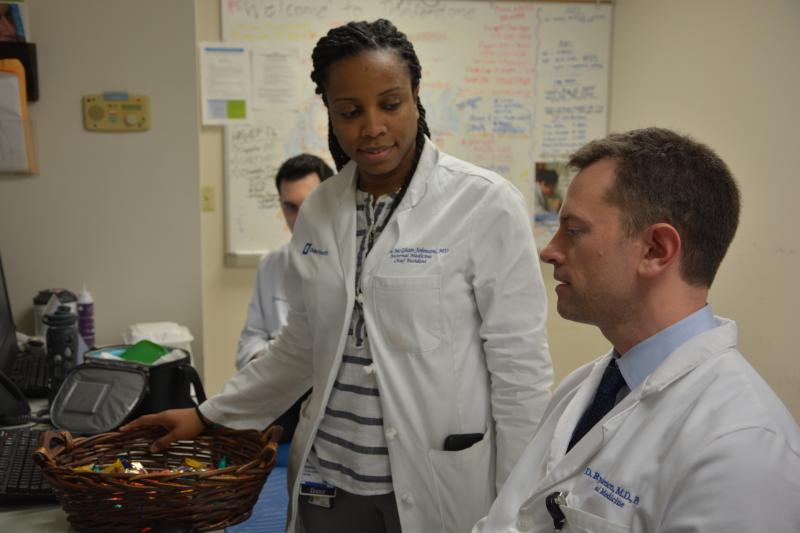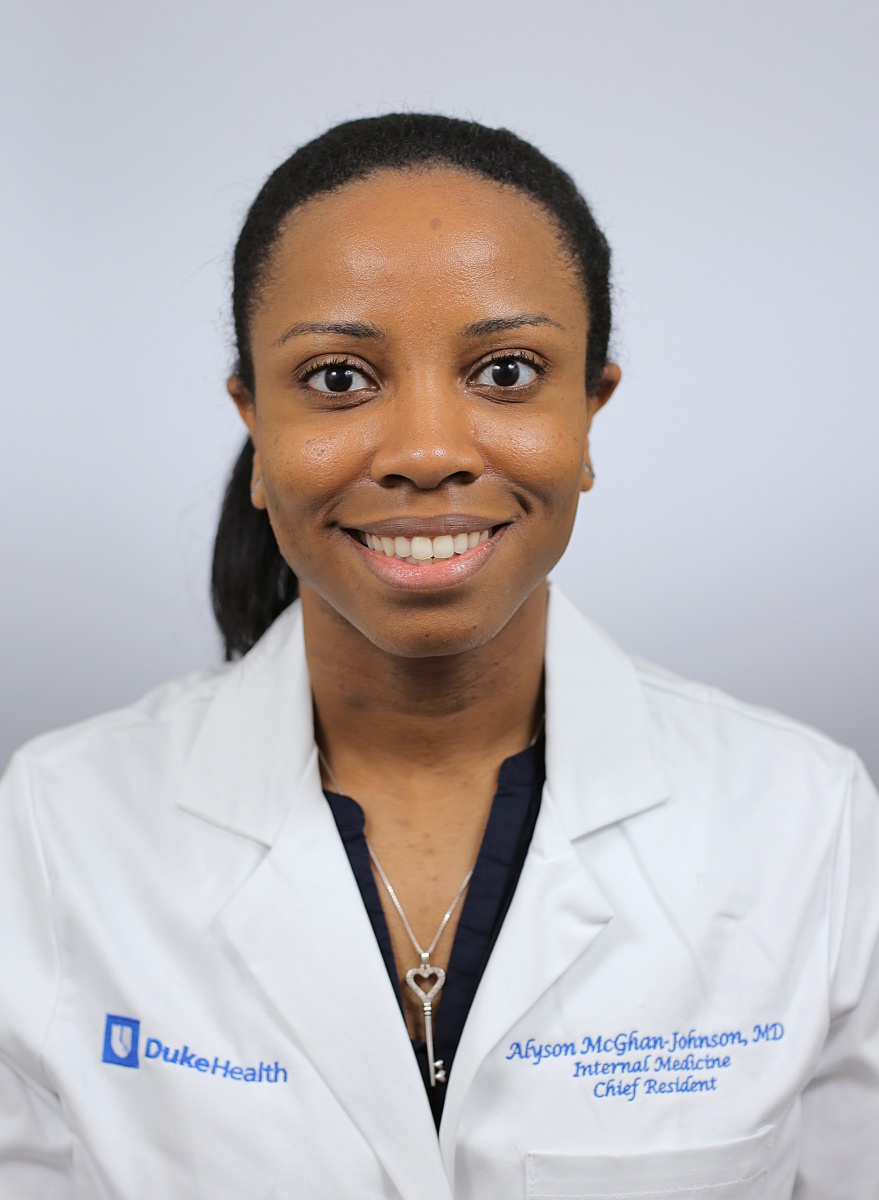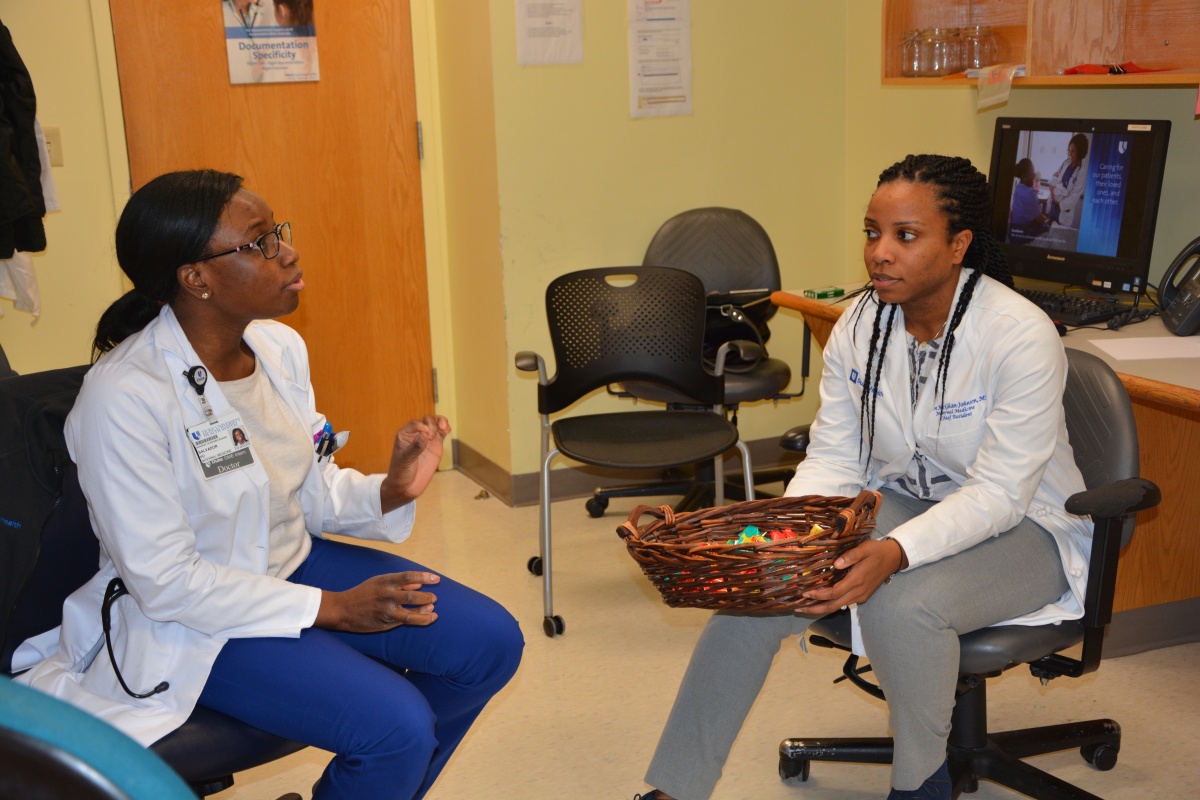
Alyson McGhan-Johnson, MD, is the 2016-17 chief resident for Duke University Hospital. Dr. McGhan-Johnson oversees the internal medicine residents at Duke University Hospital and sees herself as an advocate for the residents and an educator. McGhan-Johnson said one of her goals for the year is to foster the relationship between the chief residents and residents. “I want to be someone they can come to without any concerns or hesitations,” she said.
McGhan-Johnson grew up in Paterson, NJ. She attended Rutgers University-New Brunswick for undergrad and the Perelman School of Medicine at the University of Pennsylvania for medical school before coming to Duke University for residency. McGhan-Johnson will complete fellowship in gastroenterology at Duke next year.
Learn more about her approach to teaching, her desire to connect with residents one-on-one and her goals for the year.
Q: What are your main responsibilities as chief resident?
A: My main responsibilities for this year have been advocacy for our residents and being an educator and someone that the residents can look up to. I lead resident report, every Monday-Thursday, we have chair’s conference on Fridays, and I lead intern report twice a week. My days are full of teaching. I would like to be out there with the residents more, and I feel like I’m as much of a learner with the residents as I am a teacher. I’m not hesitant to say when I don’t know something, and I expect the residents and my co-chiefs to teach me. On Thursdays, I do something called candy rounds with my assistant chief resident, where we take a basket of candy and visit every unit starting with the 9th floor of the hospital and working our way down. We talk with the interns and residents and find out how their day and week have been. It’s a chance for me to get feedback and find out what they have learned that week. It helps me see how engaged they are with their patients and to see what different opportunities they have on service. It’s also an opportunity for me to learn and to give the residents teaching points. I like that one-on-one interaction. I care a lot about people and I like to connect with them, know them beyond their clinical skills, and get a sense of who they are as a person.
Q: What makes you a good fit for this role?
A: My abilities to listen, understand and advocate make me a good fit for this role. I like to listen, and I think the opportunity to listen to people and understand what is going on in their lives, what they want to gain from residency, and what their expectations and hopes are, has allowed me to make some changes to make those things happen for them. With listening also comes a need for understanding. I like to work hard and give the residents all I’ve got in every given situation. If something is not right, I would like to work hard to make it better.
Q: What do you hope to accomplish this year?
A: There are two things I want to accomplish. For the program, I want to create a more diverse learning environment that offers different ways of learning and growing as a physician. This includes a focus on physical exam and beside teaching, enhanced noon conferences such as gallops, and resident reports to include radiology rounds as well as discussions on how to be a good leader. I also want to continue to foster the relationship between the chiefs and residents. I’m not just one of the leaders of the program. I want to be someone they can come to without any concerns or hesitations. For myself, I want to have more confidence in my leadership ability and be a better educator.
 Q: What is your approach to leading and working with residents?
Q: What is your approach to leading and working with residents?
A: My approach to leading and working with residents is relatability. I think a good leader is someone who can relate to folks in different circumstances. This also means being honest with myself and the residents, and acknowledging that I may not know every answer, but I will work hard to find an answer or point you in the right direction. I think it’s hard when you are a resident because you want to be perfect all the time, and you are hard on yourself when you don’t know all of the answers. I want to make sure the residents know that you don’t have to know all the answers. I think that’s the beauty of medicine. You don’t have to know all the answers, but you must be willing to be taught, work hard to find those answers, and continue to take care of people. The true meaning of this whole process is to take care of patients and grow as a clinician, that’s really what makes you a good doctor. You have to strive to figure out the answers, but you’re not alone in that process and it’s an evolution, that’s what this experience is really about.
Q: How do you give residents the confidence they need to be successful?
A: I like to share my personal experiences. If you know that your chief or attending has been in your same shoes, then that leads to some level of comfort that you are not alone. We all have strengths and weaknesses. The goal is to foster your strengths and be determined to improve on your weaknesses.
Q: Do you remember a key teaching moment from your training that helped you become a better doctor?
A: The best teaching moments that I’ve had were when I was on Duke Night Float as a JAR with my co-residents. This was the rotation when I had the most autonomy as a JAR. The volume of patients and the complexity of their presentations really trained me to be a better clinician. Also this experience made me realize how much I learn from my co-residents. My biggest teaching moments have really come from my co-residents. They really pushed me to look further and look deeper and challenge myself more.
Q: What is it like working with this group of chief residents?
A: It’s been awesome. I can really lean on them with any questions or concerns that I have. For me it’s been an opportunity to get to know them on a more personal level and to lean on them for guidance. I learn so much from them. They have their specialties and areas of expertise, and I have called them many times for “consults” without hesitation.
 Q: How did you end up at Duke?
Q: How did you end up at Duke?
A: When I knew I was going to do residency in medicine, I looked at the alumni from Penn and saw where they went. Duke was a program that popped up several times on that alumni list. I didn’t know much about Duke at that time. I had no connection to North Carolina; I had never actually visited North Carolina before then. When I came here in the middle of interview season, I went to the dinner the night before and the residents were fantastic. They were having a good time; they were talking about their day on the wards and having fun. On interview day, I saw that same camaraderie throughout the day. I remember Tony Gutierrez, MD, who was one of the chief residents at the time, talking about how Duke residents run the hospital, running toward and leading the codes, are leaders of the gen med teams, focus on bedside exams and strive to be better clinicians and innovators in medicine. All of this resonated with me. The thing that sealed the deal was seeing how engaged and involved the leadership was throughout my interview day. They didn’t just come for the welcome; they were there for the whole day, and I realized that if they were there for the whole interview day, they would be there for all of us through the journey of residency.
Q: Was that impression you got about Duke on interview day correct?
A: It ended up being what I thought it was going to be and more. You spend in total about 8 hours on interview day to try to make the decision for your next three years. So you think, “was this 8 hours the real deal or will the next three years be completely different and am I going to be disappointed?” There was no disappointment for me whatsoever. The friends that I have made here have become family. They truly became a family that I can lean on. We can talk to each other and realize we are not alone in any given circumstance, whether it’s working on a busy service, a difficult situation with a patient’s family, a difficult diagnosis, or even the accomplishments on the wards and with research. I was never alone in that process and that’s one thing that has really struck me. Also, Dr. Zaas is amazing; I look up to her as a role model and try to model myself after her clinical acumen and her advocacy for the residents and her understanding of people. She’s been a great advocate for me in my career and continues to look after me even as a chief resident.
Q: Did you always want to go into medicine?
A: Yes. My mom was a certified nurse’s aide in the major hospital in Paterson, NJ, and as early as third grade she brought me to work as part of “Take Your Daughter to Work Day.” She worked labor and delivery at nights, and she actually took me one night to do it and ever since then I was hooked to medicine. All my projects during school had something to do with the sciences and medicine. Halloween was a new concept for my parents, who came to the U.S. from Jamaica, so each year I was a doctor, always dressed in scrubs for Halloween. I really loved the sciences and math. My parents supported me completely. Though they never went to college, they stressed the importance of education. They supported me through this process and have been my biggest cheerleaders.
Q: What do you want to do after your chief resident year?
A: I will finish fellowship in Gastroenterology. I want to do Advanced Endoscopy, so that will require some additional training. My ultimate job would be to stay in academic medicine and continue to be deeply involved with graduate medical education. I see myself being in a role as a clinician-educator along with clinical research.
Q: What do you like to do for fun?
A: I like to do kickboxing. It was something I got into during medical school and have found this to be a stress reliever as well as an awesome workout. I also like to do photography, which has been a creative passion, and watch different genres of movies. Of course, I love spending time with my husband, Robert. He’s my rock. He’s been a wonderful person to be with me through this process. He’s been completely supportive. He’s someone I can bounce ideas off of. He pushed me to be more confident in myself and in my decision-making. He reminds me to be proud of what I’ve accomplished.
Q: Is there anything else about you that you’d like to share with Medicine faculty and residents?
A: My door is always open. I am ready to listen to ideas and to continue thinking about how to make this place even better. This place is an amazing place and I absolutely love my experience here. I wouldn’t have chosen anything differently. I want us to continue to keep pushing to be a better place: more engagement and innovation, continuing to put the focus on the patient, and continuing to think about other ways we can move forward in this local and global community.